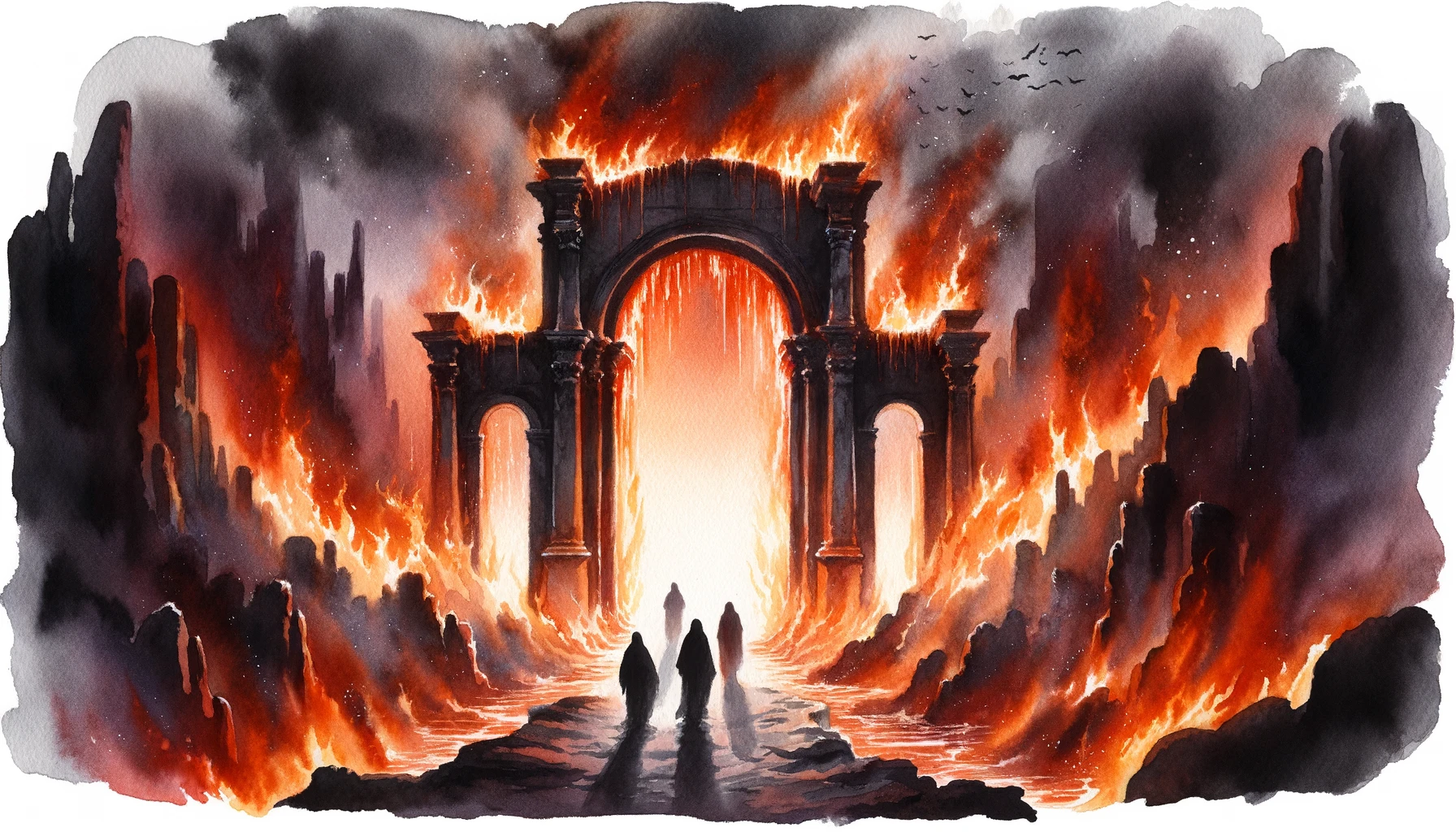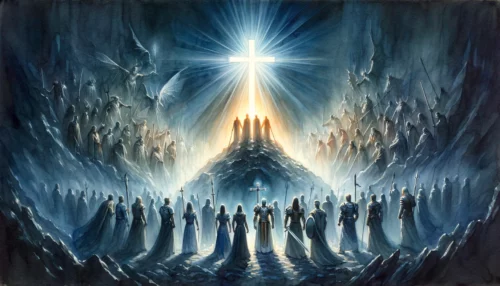The notion of spending an eternity in hell as a consequence of sin can be a challenging concept to grasp, especially when it comes to understanding God’s fairness and justice. In this article, we will investigate the Biblical perspective on eternal punishment in hell, aiming to provide clarity and comfort for those wrestling with this difficult question. We will take a closer look at the nature of sin, the character of God, and the role of Jesus Christ in our salvation. By the end, we hope to shed light on how eternity in hell is indeed a fair punishment for sin.
The Nature of Sin and Its Consequences
To understand why eternity in hell is considered a fair punishment for sin, we must first explore the nature of sin itself and the consequences it brings. Sin, in essence, is any act, thought, or attitude that goes against God’s perfect will and moral law (Romans 3:23). It is the result of our human nature, which has been tainted by the original sin of Adam and Eve in the Garden of Eden (Genesis 3). Since that event, all humans have inherited a sinful nature and are predisposed to commit sinful acts (Romans 5:12).
The Bible makes it clear that the consequences of sin are severe. The most immediate consequence is spiritual death, which leads to separation from God (Romans 6:23). Sin also brings about physical death, as our mortal bodies are subject to decay and death due to the presence of sin in the world (Genesis 3:19). Additionally, sin has a negative impact on our relationships with others, as it fosters selfishness, deceit, and other harmful behaviors (Galatians 5:19-21).
God’s holiness demands that sin be punished, and the Bible states that the ultimate punishment for sin is eternal separation from God in hell (Matthew 25:41). Hell is described as a place of unending torment, darkness, and isolation, where those who reject God’s offer of salvation will suffer the consequences of their sin forever (Luke 16:19-31; Revelation 20:11-15). The severity of this punishment reflects the gravity of sin and its offense against a holy and just God.
The idea of eternal punishment in hell may seem harsh, but it is important to remember that God is both loving and just. His love led Him to provide a way for humanity to be reconciled to Him through Jesus Christ, who paid the penalty for our sins on the cross (John 3:16). Those who accept this gift of salvation will not face eternal punishment in hell, but will instead experience eternal life in God’s presence (Romans 6:23). Therefore, the fairness of eternal punishment in hell is rooted in the fact that God has made a way for us to escape this outcome and has given us the choice to accept or reject His offer of salvation.
Taking into account the gravity of sin and its consequences, it becomes apparent that eternity in hell is a just punishment for those who choose to reject God’s grace and forgiveness. This outcome is not arbitrary, but rather a reflection of God’s holiness and justice, as well as the profound impact of sin on our lives and our relationship with Him. By recognizing the severity of sin and the reality of its consequences, we can better appreciate the magnitude of God’s love and the gift of salvation He offers through Jesus Christ.
Understanding God’s Justice and Fairness
In order to grasp why eternity in hell is a fair punishment for sin, we must examine God’s justice and fairness. The Bible teaches that God is perfectly just, meaning that He always acts in accordance with what is right and true (Deuteronomy 32:4). His justice is an intrinsic part of His character, and it ensures that all people are held accountable for their actions (Psalm 9:7-8). At the same time, God is also loving and compassionate, desiring that all people come to repentance and receive His gift of salvation (2 Peter 3:9).
The fairness of eternal punishment in hell can be understood when we consider the concept of free will. God created humans with the ability to choose, allowing us to either accept or reject His love and grace (Joshua 24:15). This freedom of choice is a fundamental aspect of our humanity and is essential for the development of genuine love and relationship with God (Genesis 2:16-17). Consequently, when people willingly and persistently choose to live in sin and rebellion against God, they are exercising their free will to reject His offer of salvation and forgiveness (John 3:18).
Moreover, it is important to note that God’s offer of salvation is extended to everyone, without exception (1 Timothy 2:3-4). The Gospel message is not restricted to a select few but is available to all who will believe and accept Jesus Christ as their Lord and Savior (Romans 10:9-13). In this way, God demonstrates His fairness, as no one is denied the opportunity to be saved from the eternal consequences of their sin (Acts 10:34-35).
Eternal punishment in hell can also be seen as fair when we consider the infinite nature of God and the offense of sin against Him. Because God is eternal and infinitely holy, the offense of sin against Him is likewise of infinite magnitude (Psalm 90:2; Isaiah 6:3). Therefore, it is fitting that the punishment for sin should also be eternal, reflecting the enormity of the offense and the infinite holiness of the One who is offended (Revelation 14:10-11).
When viewed through the lens of God’s justice, fairness, and love, the concept of eternal punishment in hell becomes more comprehensible. By providing each person with the freedom to choose and by extending the offer of salvation to all, God demonstrates His fairness and respect for human dignity. The eternal nature of hell’s punishment reflects the gravity of sin and its offense against an infinitely holy God, reinforcing the importance of embracing the salvation He so graciously provides.
The Role of Jesus Christ and the Hope of Redemption
The hope of redemption through Jesus Christ is central to understanding the fairness of eternal punishment in hell. While the concept of hell may seem daunting, it is crucial to remember that God has provided a way of salvation and escape from this fate through His Son, Jesus Christ (John 14:6). This section will explore the role of Jesus in the redemption of humanity and how His sacrifice impacts the issue of eternal punishment.
Jesus, the Son of God, came to earth to live a sinless life and ultimately die on the cross as a sacrifice for the sins of humanity (1 Peter 2:22; 1 John 3:5). His death on the cross satisfied the righteous demands of God’s justice, making it possible for us to be forgiven and reconciled to God (Romans 5:6-11). Through His resurrection, Jesus defeated the power of sin and death, securing eternal life for all who believe in Him (1 Corinthians 15:20-22).
The redemptive work of Jesus on the cross is available to all who put their faith in Him as their Lord and Savior (John 3:16). This means that anyone, regardless of their past sins or mistakes, can receive God’s forgiveness and be saved from eternal punishment in hell (Ephesians 2:8-9). The decision to accept or reject this gift of salvation lies with each individual, and those who choose to believe in Jesus will not face eternal separation from God but will experience eternal life in His presence (John 5:24).
It is important to emphasize that God does not desire anyone to perish in hell but wants all people to come to repentance and receive the gift of eternal life (2 Peter 3:9). This demonstrates God’s immense love and compassion, as well as His commitment to the fairness of the salvation process. By offering salvation to all people through Jesus Christ, God ensures that no one is excluded from the opportunity to escape eternal punishment in hell (1 Timothy 2:3-4).
The hope of redemption through Jesus Christ is a vital aspect of understanding the fairness of eternal punishment in hell. By making salvation accessible to all people, God demonstrates His love and justice, ensuring that no one is denied the opportunity to be saved from the consequences of their sin. As we come to grips with the reality of hell and the eternal nature of its punishment, it is essential to remember the life-changing power of Jesus Christ and the hope of redemption He offers to all who will believe.
Finding Hope Amidst the Eternal Consequences
As we have explored the Biblical perspective on eternity in hell as a fair punishment for sin, we have delved into the nature of sin and its consequences, God’s justice and fairness, and the hope of redemption through Jesus Christ. It is evident that the concept of eternal punishment in hell is deeply rooted in God’s holiness, justice, and love. By offering salvation through Jesus Christ, God ensures that everyone has the opportunity to escape this fate and experience eternal life in His presence.
To further reflect on this topic, consider these questions:
- How does understanding the fairness of eternal punishment in hell impact your view of God’s character?
- In what ways can you personally embrace the hope of redemption offered through Jesus Christ?
- How can you share the message of hope and salvation with others who may be struggling with the concept of eternal punishment in hell?
Let us remember that despite the severity of sin and the eternal consequences it brings, God’s love and grace abound. Through Jesus Christ, we are offered a way out of darkness and into the light of God’s presence for all eternity. May this truth inspire us to share the hope of redemption with those around us and live our lives in grateful response to the incredible gift of salvation.














